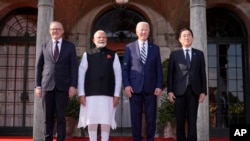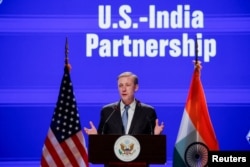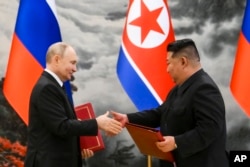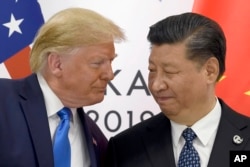Jake Sullivan, the outgoing U.S. national security adviser, is urging the incoming Trump administration to continue President Joe Biden's strategy of bolstering ties with allies and partners in the Indo-Pacific to counter adversaries that include China and North Korea.
"The case we will make to them is that the American position in the region is incredibly strong right now," Sullivan said in response to VOA's question during a roundtable with journalists on Friday.
"There should be more continuity than significant change with respect to our Indo-Pacific strategy," he said. "But I don't know what the incoming team will actually end up doing."
Sullivan, considered one of the main architects of the Biden administration's Indo-Pacific strategy, said the president's approach is "working in a big way," and he warned that straying from that will "bring risk."
Sullivan acknowledged, however, that the administration failed to make substantial progress on denuclearization of the Korean Peninsula.
As the threat from Pyongyang remains as acute as it has ever been, Sullivan highlighted key distinctions: closer cooperation between North Korea and Russia and a "broader alignment of competitors and adversaries — Russia, China, North Korea, Iran."
He repeated the administration's warning against reducing U.S. support for Kyiv, something that President-elect Donald Trump has signaled he would do. What happens in Ukraine really matters for the Indo-Pacific, Sullivan said, because "China's watching."
Biden's aides have often voiced concern that the West's reluctance to bolster Kyiv's defenses could embolden China to follow Russia's lead and invade its smaller democratic neighbor, Taiwan, or act even more aggressively on its disputed territorial claims in the South China Sea.
Bonnie Glaser, managing director of German Marshall Fund's Indo-Pacific Program, said that cooperation between Moscow and Pyongyang has developed quickly, with North Korea sending its troops to support Russia's invasion of Ukraine, and is likely to expand.
"We have yet to see what weapons systems or military technologies Putin has promised to deliver to Kim," she told VOA, referring to Russian President Vladimir Putin and North Korean leader Kim Jong Un. "Beijing has refused to apply leverage to stop this trend."
Sullivan expressed confidence that the administration has "set up a great opportunity for the next team" to enhance the U.S. position and has "shifted the balance of power" in the Indo-Pacific.
He outlined Biden's approach of creating a network of alliances and partnerships, including enhancing cooperation with the Quad, an informal grouping with India, Australia and Japan, as well as rolling out the AUKUS security deal with the United Kingdom and Australia to provide Canberra with nuclear-powered submarines to better patrol the waters of the region.
Sullivan also highlighted trilateral cooperation among the U.S., Japan and South Korea, with the two former adversaries now working together to deter North Korea's nuclear threat, and among the U.S., Japan and the Philippines to push back against Beijing's aggression in the South China Sea.
Continuity or change
Because relations between Washington and Beijing will likely remain adversarial, the region could see more continuity on U.S. policy toward China under the incoming administration.
Trump has selected two well-known China hawks for key roles in his "America First" Cabinet: Senator Marco Rubio, Trump's pick for secretary of state, and Representative Mike Waltz, the man Trump is eyeing to become Sullivan's successor.
However, Waltz earlier this week announced a sweeping directive to terminate all national security staffers loaned from other departments and agencies who serve in apolitical, nonpartisan senior staff roles. Waltz said the firings were meant to enforce absolute alignment with Trump's policy agenda.
Aside from staffing the National Security Council with Trump loyalists, it’s unclear whether the president-elect will employ the same approach of leveraging alliances to deter China.
The first Trump administration saw that "multilateral alliances are more a burden than a reality,” said Aaron David Miller, a senior fellow at the Carnegie Endowment for International Peace. During his first term, Trump terminated U.S. membership in organizations and agreements that included the Paris Climate Accord, the U.N. Human Rights Council and the World Health Organization.
"If you do form alliances, they're going to have to be based on clear, specific, quid pro quo transactions," he told VOA.
During his first term, Trump also focused more on bilateral ties, and he may fall back on that approach.
"He might emphasize ties with strong conservative leaders like [Prime Minister Narendra] Modi in India but de-emphasize groups like the U.S.-Japan-South Korea trilat[eral], particularly if a new government in Seoul drifts a little away from Washington," said Zack Cooper, senior fellow at the American Enterprise Institute.
"What remains unclear is whether Trump will be confrontational with China outside the economic arena," Cooper told VOA. Key uncertainties include whether the U.S. will pursue a less robust response to Beijing's moves in the Taiwan Strait and the South China Sea.
"Trump personally seems more open to engagement with [Chinese President] Xi Jinping and focused on trade issues, but many in his administration will be pushing for a hard line on security and technology issues," Cooper said.
Change of trade strategy
Trade is one area where analysts expect a significant change in strategy as Trump appears set to enact protectionist measures, threatening to wield tariffs as a weapon of punishment not only on adversaries but also on regional partners, particularly those with large trade surpluses, including Japan.
Trump is expected to undo the Biden's administration's effort to revitalize trade with the region. During his presidential campaign, Trump vowed to kill the Indo-Pacific Economic Framework, Biden's 2022 deal with countries in the region, saying that it will hurt American manufacturing and workers.
IPEF was Biden's attempt to bolster economic ties with Indo-Pacific countries five years after Trump withdrew the U.S. from the Obama administration's most important trade initiative, the Trans-Pacific Partnership, immediately upon entering his first term.
The framework pursues nontrade priorities such as supply chain resilience, secure digital infrastructure and sustainable clean energy transition. It has been criticized by many in the region for not offering market access measures as Beijing aggressively expanded its economic clout, including through the Regional Comprehensive Economic Partnership, the world's largest regional free-trade pact that covers almost one-third of the world's population and GDP.
VOA’s Steve Herman contributed to this report.







